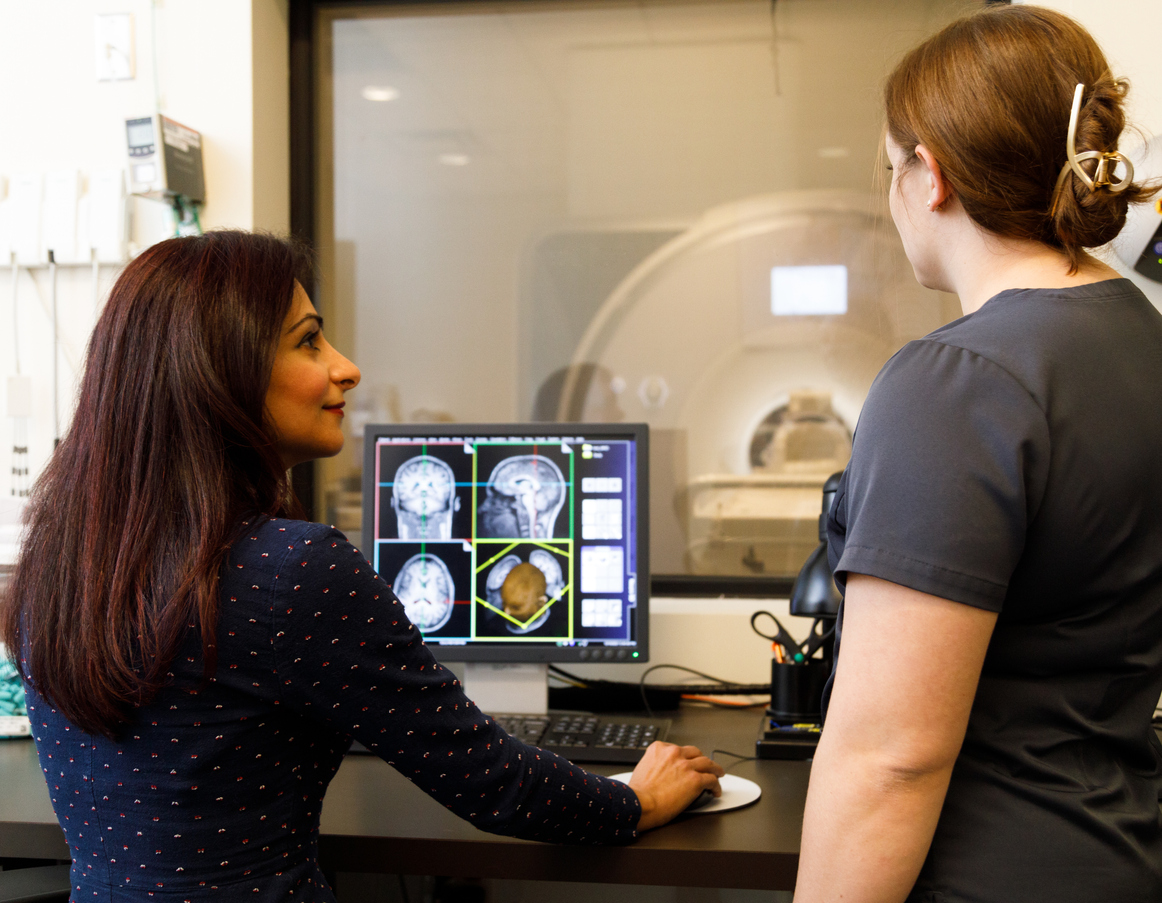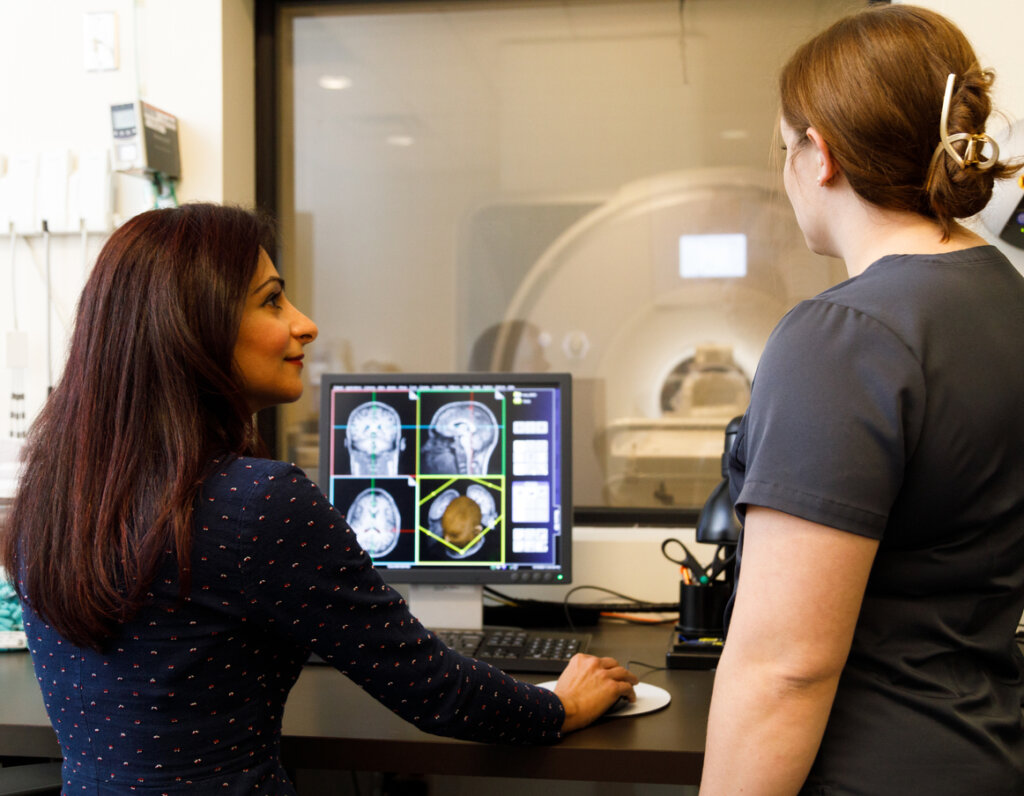

Neuronavigated Transcranial Magnetic Stimulation (TMS) has emerged as a promising FDA approved, non-invasive treatment option for individuals suffering from depression. This innovative therapy utilizes pulsing magnetic fields to stimulate specific regions of the brain, offering potential relief for those who have not responded to traditional treatments.
In our Geode Health Rockford office, we are proud to have treated thousands of patients on the NextStim TMS system, and have seen the tremendous positive impact it’s had on our patients. In this blog, Dr. William Giakas walks through the process of TMS, its efficacy, and how to get started with this breakthrough treatment in Rockford, Illinois.
What Is TMS?
Transcranial Magnetic Stimulation (TMS) is a non-invasive medical procedure that involves the use of magnetic fields to stimulate specific regions of the brain. It works by generating brief, focused magnetic pulses that pass through the scalp and skull, reaching the targeted brain areas. These magnetic pulses induce electrical currents in the neurons, thereby modulating brain activity.
TMS represents a significant advancement in the field of mental health treatment by providing a safe, non-invasive, targeted, and potentially effective alternative for individuals who have not responded to conventional therapies for major depressive disorder (MDD).
What Is Neuronavigation in TMS?
Neuronavigation in TMS refers to the use of advanced imaging techniques to precisely locate and target specific brain regions during TMS therapy.
By utilizing advanced imaging techniques, such as MRI or fMRI, medical professionals can accurately identify and map the brain regions that require stimulation. This targeted approach ensures that the magnetic pulses are delivered to the precise location, optimizing the effectiveness of the treatment. Our friendly team in Rockford can help answer any questions you may have on this process.
Efficacy of Neuronavigated TMS for Depression
Many individuals wonder how effective TMS can be for depression, especially if other treatment options have not provided relief in the past. If you’ve suffered from treatment-resistant depression, there is good news.
Numerous studies have demonstrated the efficacy of neuronavigated TMS in alleviating symptoms of depression. Clinical trials have shown that TMS can significantly improve depressive symptoms and enhance overall well-being. All of the associated symptoms of major depression, such as anxiety, sleep disturbances, and poor concentration can also improve. The procedure is generally well-tolerated and has minimal side effects compared to other treatment options like medication or electroconvulsive therapy (ECT).
Advantages of Neuronavigated TMS
- Non-invasiveness: Neuronavigated TMS does not require any surgical procedures or anesthesia. It is a non-invasive treatment option that does not involve incisions or medications that may cause systemic side effects.
- Targeted Approach: The ability to precisely target specific brain regions sets neuronavigated TMS apart from other treatments. By focusing on the regions associated with depression, this therapy offers a more personalized and effective approach.
- Minimal Side Effects: Neuronavigated TMS is generally well-tolerated and has minimal side effects. The most common side effects include mild scalp discomfort or headache, which are usually temporary and subside on their own. Patients can operate a vehicle immediately after each treatment and drive themselves back home or to work.
- Potential for Long-Term Relief: Studies have shown that the benefits of neuronavigated TMS can extend beyond the treatment period, providing long-term relief for individuals suffering from depression. Patients who responded well to neuronavigated TMS can have additional treatments in the future if they relapse and are likely to respond again.
How to Get TMS Therapy in Rockford, IL
Neuronavigated TMS is a specialized treatment that is typically offered in specialized clinics or major medical centers. If you are considering this treatment option, it is important to consult with a qualified healthcare professional who can assess your eligibility and guide you through the process.
While neuronavigated TMS offers great potential, it may not be suitable for everyone. Individuals with certain medical conditions or implanted devices may not be eligible for this treatment. Therefore, a comprehensive evaluation and consultation with our team at Geode Health Rockford is necessary to determine the appropriateness of TMS therapy for each individual.
With its proven efficacy and minimal side effects, TMS provides hope for individuals seeking relief from the burdens of depression. Consult with a healthcare professional to explore whether neuronavigated TMS is the right treatment option for you or your loved ones.
Call our Rockford location now to discuss TMS therapy options.
—
About the Author: Dr. William Giakas completed training in psychiatry at the Yale University Department of Psychiatry and has been practicing psychiatry in Rockford for over 30 years. A recognized expert in the medical diagnosis and treatment of mental health problems in all ages, Dr. Giakas has been supporting his patients by making the most advanced form of neuronavigated TMS- Nextstim Smartfocus TMS- available to his patients in Rockford, IL. Dr. Giakas has treated thousands of patients to help them overcome treatment resistant depression and he has become a recognized expert in the delivery of TMS services.
Disclaimer: This article is for informational purposes only and should not be considered medical advice. Consult with a qualified healthcare professional for personalized guidance and information about neuronavigated TMS or any other medical treatment.


